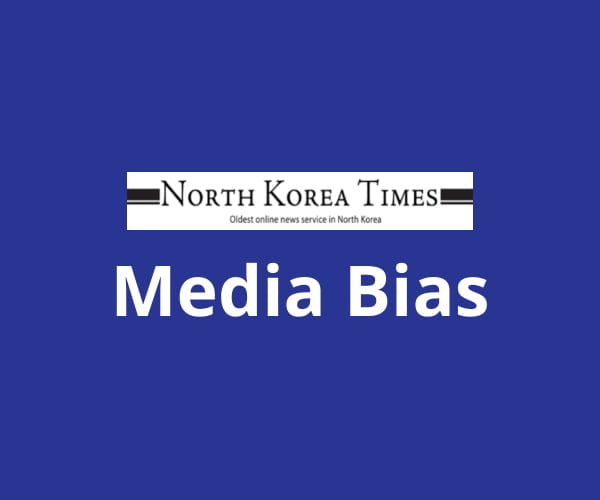
The North Korea Times is the oldest online news service in North Korea. Established in 2004, the source services the country despite its scarce access to the internet. The portal is continuously updated with news from Pyongyang to the entire Korean Peninsula; the site claims “constant and reliable source of independent news coverage of North Korea.”
This article will analyze the online newspaper’s coverage and editorial decisions to determine whether or not significant bias is present in their reporting. Our analysis will look to provide a comprehensive answer as to whether or not The North Korea Times is biased and will shed light on factors that contribute to media bias in general.
How Does Biasly Rate News Sources?
Biasly’s algorithms produce bias ratings to help provide multiple perspectives on given articles. Biasly has analyzed 200,000+ news articles from more than 3,200 news sources through our A.I. technology and team of political analysts to find the most factual, unbiased news stories.
Biasly determines the degree of political bias in news sources by using Biasly’s Bias Meter Rating, in which Biasly’s team analyzes media sources’ reliability and bias and produces three scores, a Reliability Score that measures the accuracy of media sources; an A.I. Bias Score, evaluated by A.I.; and an Analyst Bias Score evaluated by political analysts. These scores are rated based on seven rating metrics including Tone, Tendency, Diction, Author Check, Selection/Omission, Expediency Bias, and Accuracy. These metrics help our analysts to determine the political attitude of the article.
Our A.I. a machine-learning system employs natural language processing and entity-specific sentiment analysis to examine individual articles and determine their bias levels. By analyzing the key terms in an article such as policies, bias phrases, political terminologies, politicians, and their nicknames, the algorithms can rate the attitude of the text. Bias scores range from -100% and 100%, with higher negative scores being more liberal and higher positive scores being more conservative, and 0% being neutral.
Is the North Korea Times Politically Biased?
Biasly’s rating for the North Korea Times is based on two scores- one from its computer algorithms which are based on A.I., and one from its Analysts. Biasly’s ratings include the following: a Computer bias score of Center and an Analyst bias score of Center, which means that the source provides political coverage from an overall central perspective.
Analyst scores are based on an average of at least 15 articles, each being reviewed by one liberal, moderate and conservative analyst. The more articles included in a rating, the more accurate these analyst scores will be. Likewise, as Biasly rates more articles, the scores will become more accurate. Biasly’s scores closely align with results determined by third-party research agencies as well.
The remainder of this article will talk about different ways to identify bias so that you can separate opinion from facts and in turn become a more informed consumer of news.
Before we begin, we need to discuss bias. Bias is a natural function of humans, and we can express it both consciously and unconsciously. Bias is one of the most fundamental forms of pattern recognition in humans. This isn’t to lower the bar and say that “all things are biased,” but to explain the process in which we may come to trust certain news organizations that display patterns of coverage.
On the media’s part, there is an incentive to retain audiences, encourage them to purchase subscriptions, and rate products positively. Bias is a two-way street, people want to see news stories about things they care about, and the media needs viewers to continue their operations. This creates a positive feedback loop that influences what stories are covered and from what perspective. This also explains the actions of more liberal news organizations.
Analysis of Bias in North Korea Times Online Articles
You can determine bias in many ways, but some of the most common metrics to use include Tone, Author, and Diction, which are the primary metrics we will use below. Tone is the attitude of the writing, whereas diction represents the writer’s word choices. The Author metric refers to the author of the article- including his or her demonstrated stance on issues through past articles and social media posts.
The first article we’ll examine is called “Black people 13 times more likely to be prosecuted over crack cocaine.” Biasly has rated this article as “Somewhat Liberal” on the Bias Meter.
The tone is clear from the beginning that there are racial injustices and laws that have disproportionately been used to target African Americans, including the Anti-Drug Abuse Act of 1986, which took a “tough-on-crime” approach around crack use in the 1980s. This is reflected in the writing as the author states:
“While appearing race-neutral on the surface, this law was disproportionately wielded as a weapon against African Americans.”
This underscores the importance of the issue and, as the article then states, provides context just as to how unfair these laws continue to be;
“And even in 2020, the U.S. The Sentencing Commission reported that ‘Black people made up 77 percent of all federal crack convictions.”
Similarly, the diction of the article is not extreme, but clearly acknowledges a racial issue and the steps that need to/are currently being taken to fix the issue. The author uses phrases such as an “increasingly broad alliance of organizations for drug reform,” “racial justice,” and “human rights.” Moreover, the author identifies this issue as “one of the gravest examples of racially based injustices,” which indicates to us that he is in full support of the bill for criminal justice reform.
Author Phillip Smith is a drug policy journalist, writer, and editor for the Drug War Chronicle and the nonprofit Stop the Drug War. The article lists the source as Independent Media Institute, whom Smith primarily writes for. This indicates to us that Smith is not a writer for North Korea Times, but that his materials were used to create the article. Nonetheless, Smith’s past articles are entitled “U.S. Congress Votes To Kill Racist Crack and Powder Cocaine Sentencing Disparity” and “Biden’s Drug Policy Priorities Are a Small Step in the Right Direction, But Old Attitudes Linger” which indicates that his personal stance is clearly reflected in both this piece and others.
While the author strives for objectivity, the reality is that there is a racial injustice present in the story with which he sides to eliminate the injustice. This suggests that, while most elements of the story are neutral, the story leans slightly left, which is similar to our analysis of The North Korea Times to stay near the center in its articles.
Even though this article is mostly central, article bias can differ between topics and authors, even if they come from the same source. As a result, it is important to look for signs of bias, with examples being the tone, diction, author, and omission bias present in any article you read.
An article that demonstrates little to no bias throughout the article from the North Korea Times is titled “Japan Conservatives Eye Constitutional Revision After Election Win.” Biasly’s A.I. rating for the article is “Center” and the language is very cut-and-dry throughout the article. Emotionally loaded language that could influence the reader’s opinion is avoided:
“Political forces that support a constitutional revision also won two-thirds of seats in the chamber – an important threshold that could make an amendment more likely.”
“Sunday’s election result, as well as recent opinion polls, suggests broad public support for Kidasha’s more assertive foreign policy.”
No presence of bias is indicated in the article that would influence its content. However, a very recent article titled, “US elites stuck in Cold War North Korea” has an anti-American narrative coming from North Korean leadership, specifically their deputy foreign minister.
The heavily criticizing article states:
“North Korea’s deputy foreign minister has accused the US of ‘unjust and outrageous hostility’ towards Pyeongchang and Moscow, saying it shows Washington’s hegemonic mentality based on Cold War logic.”
“The US-ill minded repugnancy toward the North Korea-Russia relations only reveals that it lacks power and wits in the showdown with the anti-imperialist independent countries,’ Im Chon Il said in a statement on Sunday.”
As a result, these statements are clearly made with bias and the intention to support an anti-American native. No Biasly analysis or rating is currently available for this article.
Who Owns the North Korea Times?
North Korea Times is an online newspaper that provides coverage regionally and nationwide. While its subjects vary from international news, business, and “an endless supply of news,” its sites are administered by Midwest Radio Network, which is based out of Australia. Beyond this, the only other mentions of participation and ownership includes Bankers from Westpac Banking Corporation out of Sydney and their Affiliates ‘Big News Network’ out of Dubai, UAE.
While North Korea Times and associated sites (Asia Bulletin, Asia Pacific Star, China National News to name a couple examples) are administered by Midwest Radio Network, it is unclear how much of this source is ran by North Korea themselves and how involved North Korea leadership truly is.
In North Korea, the state strictly governs media. The notable state-run publications are Rodong Sinmun (the newspaper of the Workers’ Party) and the Korean Central News Agency (the official state news agency).
Additional information about the source can be found on its About Us page.

Source: https://www.northkoreatimes.com/
How to Evaluate and Uncover Bias
It can often be difficult to tell if the news you watch is biased. If you have settled on a news channel, it’s usually because you trust the information you are gaining. Unfortunately, many trust the information they are hearing because it confirms what they already believe. This is referred to as “confirmation bias.” It is important to challenge your beliefs and get third-party verification that what you are hearing is the full story. This is why we recommend using Biasly to compare different news stories side-by-side using our bias ratings to figure out what both sides think of a political issue.
Recall that Biasly gave The North Korea Times a Central bias score. Nevertheless, remember that bias varies by article, and that the source does not always explicitly publish content found to be Central on the political spectrum. Additionally, some articles will inherently have more bias than others just based off of their type– opinion pieces versus general news articles. So, while every article you read will be biased even to the smallest extent, it is important to use Biasly’s News Check to help determine the bias in any content that you consume.























